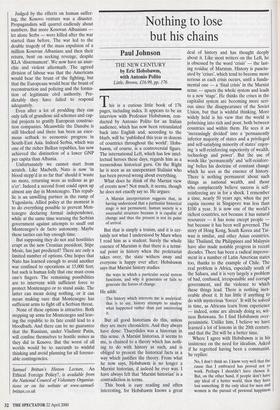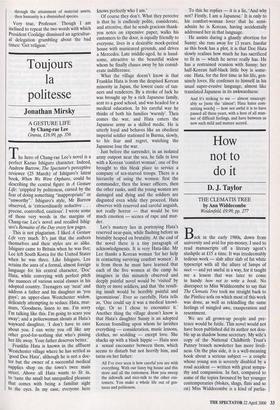Nothing to lose but his chains
Paul Johnson
THE NEW CENTURY by Eric Hobsbawm, with Antonio Polito Little, Brown, £16.99, pp. 176 This is a curious little book of 176 pages, including index. It appears to be an interview with Professor Hobsbawm, con- ducted by Antonio Polito for an Italian audience, which has now been retranslated back into English and, according to the blurb, will be 'published this year in dozens of countries throughout the world'. Hobs- bawm, of course, is a controversial figure. The international Left, which has few intel- lectual heroes these days, regards him as a tremendous historical guru. On the Right he is seen as an unrepentant Stalinist who has been proved wrong about everything.
What does he think of the Marxist view of events now? Not much, it seems, though he does not exactly say so. He argues:
A Marxist interpretation suggests that, in having understood that a particular historical stage is not permanent, human society is a successful structure because it is capable of change and thus the present is not its point of arrival.
But that is simply a truism, and it is cer- tainly not what I understood by Marx when I read him as a student. Surely the whole essence of Marxism is that there is a termi- nal point in history when the proletariat takes over, the state withers away and everyone is happy ever after. Hobsbawm says that Marxist history studies
the ways in which a particular social system functions, and why it generates or fails to generate the forces of change.
He adds:
The history which interests me is analytical: that is to say, history attempts to analyse what happened rather than just uncovering it.
But all good historians do this, unless they are mere chroniclers. And they always have done: Thucydides was a historian in this sense. A Marxist historian, it seems to me, is chained to a theory which has noth- ing to do with history as such, and is obliged to present the historical facts in a way which justifies the theory. From what he now says, Hobsbawm is no longer a Marxist historian, if indeed he ever was. I have always felt that 'Marxist historian' is a contradiction in terms.
This book is easy reading and often interesting, for Hobsbawm knows a great deal of history and has thought deeply about it. Like most writers on the Left, he is obsessed by the word 'crisis' — the last- ing residue of Marxism. History is punctu- ated by 'crises', which tend to become more serious as each crisis occurs, until a funda- mental one — a 'final crisis' in the Marxist sense — upsets the whole system and leads to a new 'stage'. He thinks the crises in the capitalist system are becoming more seri- ous since the disappearance of the Soviet Union, but that is wishful thinking. More widely held is his view that the world is polarising into rich and poor, both between countries and within them. He sees it as `increasingly divided' into a 'permanently inferior majority of states and a privileged and self-satisfying minority of states' enjoy- ing 'a self-reinforcing superiority of wealth, technology and power'. But the use of words like 'permanently' and 'self-reinforc- ing' belies his doctrine of constant change which he sees as the essence of history. There is nothing permanent about such things as national wealth, and those who complacently believe success is self- reinforcing are in for a shock. I remember a time, nearly 50 years ago, when the per capita income in Singapore was less than $100 a year. It is now one of the world's richest countries, not because it has natural resources — it has none except people but because it has been well governed. The story of Hong Kong, South Korea and Tai- wan is similar, and other Asian countries, like Thailand, the Philippines and Malaysia have also made notable progress in recent decades. There has been a radical improve- ment in a number of Latin American states too, thanks to the example of Chile. The real problem is Africa, especially south of the Sahara, and it is very largely a problem of bad, confused, irresponsible and corrupt government, and the violence to which these things lead. There is nothing inex- orable about it. It has little if anything to do with mysterious 'forces'. It will be solved in time, as Africans learn from experience — indeed, some are already doing so, wit- ness Botswana. So I find Hobsbawm over- pessimistic. Unlike him, I believe we have learned a lot of lessons in the 20th century, and that the 21st will be a better time.
Where I agree with Hobsbawm is in his insistence on the need for idealism. Asked if he regretted having been a communist, he replies:
No, I don't think so. I know very well that the cause that I embraced has proved not to work. Perhaps I shouldn't have chosen it. But, on the other hand, if people don't have any ideal of a better world, then they have lost something. If the only ideal for men and women is the pursuit of personal happiness through the attainment of material assets, then humanity is a diminished species.
Very true, Professor. Though I am inclined to repeat the two words with which President Coolidge dismissed an agricultur- al delegation grumbling about the bad times: 'Get religion.'



























































 Previous page
Previous page